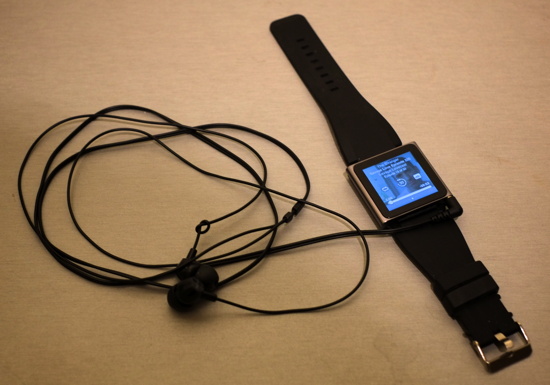The first rule of any technology used in a business is that automation applied to an efficient operation will magnify the efficiency. The second is that automation applied to an inefficient operation will magnify the inefficiency.
Bill Gates
There is a lot of speculation about smartphone-like wristwatches at the moment. While Google went Glasses(*), Apple is apparently developing them, Samsung too. There are also Kickstarter backed projects like Pebble who use wristwatches to control your smartphone. I think that a wristwatch-like computer is the way to go — even with what is available today.
Having a computer at your wrist (or something that controls your smartphone and uses its processing power and connectivity) is
extremely practical. I don’t own a Pebble, but I’ve been wearing an old iPod Nano 6G on my wrist for about a month. It does not give me more than access to music and podcasts, but even this is extremely useful in everyday life. The audio cable runs along my arm beneath my T-shirt and is wound around the Buff headware I wear around my neck. This keeps the audio cable in place (will probably replace it with Bluetooth).
While I like my smartphone and can use it almost anywhere (even in the rain), the iPod on my wrist lets me quickly start/stop the podcast I’m listening to (going through the previous shows takes a while, currently 226/335) or jump back 30 seconds when I miss something (e.g., due to environmental noise like cars passing by). Very useful when I’m walking to/from work (each trip is 3,4 km or about 40 minutes).

I wonder how many MOOC courses could work this way — listening to lectures should work, if they do not rely on slides. After all, if you regularly walk the same way you are on autopilot most of the time (i.e., walking to your destination does not take any cognitive effort), and the audio only with the ability to quickly jump back should (do it on your own risk) prevent you from walking into traffic.
Now imagine having more functionality on your wrist. It cannot replace a smartphone (screen size too small for reading, and position to awkward for longer reading) but quickly checking information … I see its uses. The wrist is the perfect place to have it quickly available — that’s why wristwatches were so successful before people replaced their time-keeping function with smartphones. Now it could very well swap back — moving functionality to the wrist. Esp. if you can get the information as audio and use quick controls on your wrist to deal with the information (e.g., bookmark, default reply messages, etc.). And if the device is actually water-proof and shock-proof, allowing you to use technology where you normally would not.
Smartphones made capturing ideas much easier (and socially acceptable, a notepad arouses suspicion, typing on your smartphone does not). Having a computer on your wrist has a lot of potential for capturing or generating ideas as well.
So I’m looking forward to the future.
(*) I think that until glasses need to be easy and unobtrusive to use like normal glasses: The glasses should sync with your infrastructure automatically, display information that you can read without appearing awkward in social interaction, the battery has enough power for more than a day’s worth of use and gets charged automatically, e.g., by putting it on a charging pad when you go to sleep. The future is hopefully a mixture of three to four components: A smartphone-like device that does the bulk of the processing and offers the connectivity, a control device on your wrist, glasses to display the information, and (either integrated in the glasses or separately) in-ear headphones. Might look like a cyborg with its exo-technology, but if used correctly I see a lot of possibilities. Hopefully better than in this vision of the future.